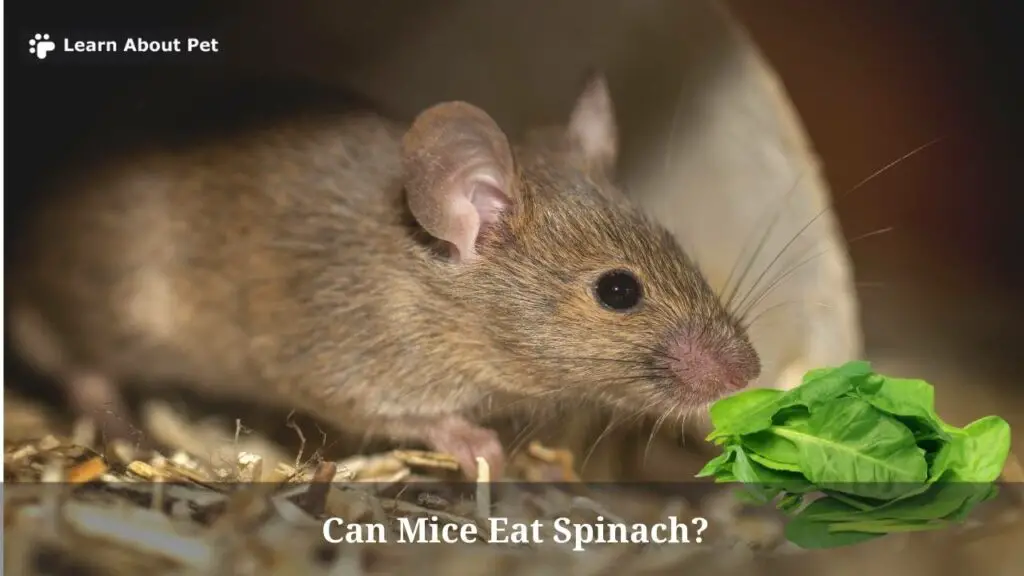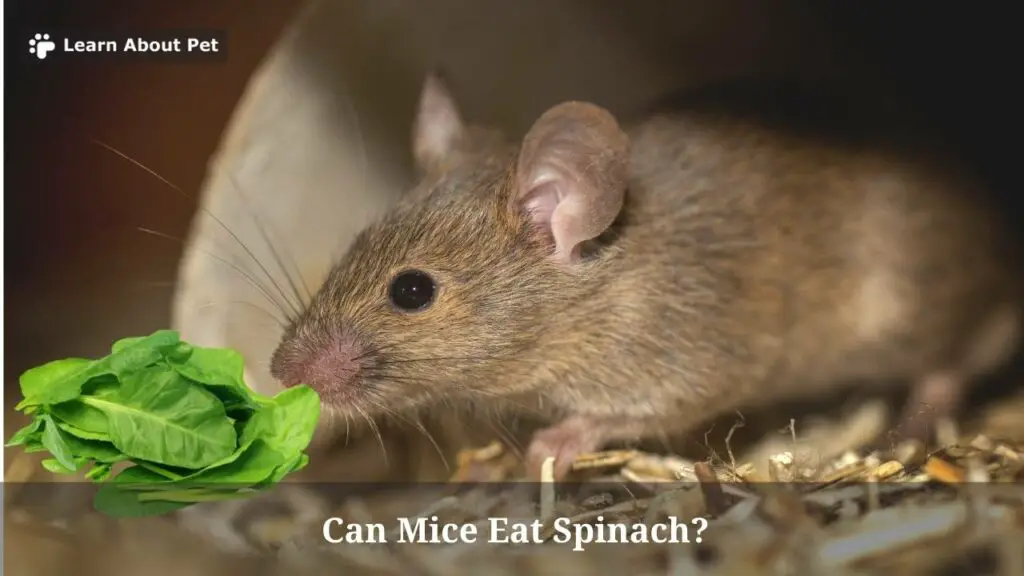If you keep mice as pets, there are times when you may find yourself considering sharing your spinach veggies with them. But before actually giving your mice spinach, you may have concerns as to whether eating spinach is good for mice. This article explores that issue.
Can mice eat spinach? Yes, mice can eat spinach. Spinach has vitamins, minerals, fiber and other nutrients that are good for mice. But spinach also has an exceptionally high moisture content, and overfeeding mice on spinach can therefore cause them to have diarrhea.
Thus spinach for mice is only ideal if they eat it in moderation.
Spinach for mice can turn out to be quite harmful if they nibble too much on it. The high moisture content in spinach often leads to mice diarrhea, which in turn sometimes causes potentially fatal dehydration.

In modest quantities though, spinach is a very good food for mice, almost a super-food.
Yet for many people, the very idea of mice eating green vegetables (like the spinach in question) can be rather hard to internalize.
That is why you often find people asking, will mice eat vegetables? Do mice eat green leaves at all?
Others are more direct, in asking whether mice are capable of eating spinach at all.
Therefore an ideal place for us to launch into the discussion is by finding out whether mice are capable of eating spinach.
Are Mice Capable Of Eating Spinach?
Mice are able to eat spinach, when they happen to get it.
If you place some spinach leaves before mice, they will almost instantly sense that it is food. Then they will proceed to eat it.
If you leave your spinach lying around carelessly, you may find (pest) mice having eaten it.
People who keep mice pets sometimes give them spinach to eat. So mice are indeed capable of eating spinach.
Is Spinach Safe For Mice?
If mice eat spinach in moderate amounts, it is safe for them.
None of the chemical compounds that are present in spinach is expressly toxic to mice.
But some of the nutrients in spinach can eventually be problematic for mice, if the mice overfeed on spinach.
Spinach is rich in potassium. But too much potassium eventually can cause heart issues for mice.
Spinach is also rich in calcium and oxalates. But too much of calcium and oxalates can eventually cause kidney problems for mice.
Furthermore, spinach is rich in moisture. But too much moisture can cause diarrhea in mice.
Due to all these facts, spinach can only be safe for mice if the mice eat it in small quantities.
Can Mice Benefit From Eating Spinach?
Mice can benefit from eating spinach.
When mice eat spinach, they tap into the vitamins that spinach is rich in. Those are the likes of vitamin A, vitamin C and vitamin K.
Moreover, when mice eat spinach, they tap into the minerals that spinach is rich in. Those include the likes of calcium, potassium and manganese.
Spinach is also rich in moisture. And this is good for mice, who often have to get water through food, as opposed to drinking it directly.
We also need to mention that spinach has antioxidant properties. That is on top of anti-inflammatory properties.
So there are many ways in which mice can benefit from eating spinach.
Can Pet Mice Eat Spinach?
Many of the people who express interest in knowing whether mice can eat spinach have one thing in common. They are folks who keep mice as pets.
So they specifically seek to know whether pet mice can eat spinach. And the answer is ‘yes’, pet mice can eat spinach.
If you keep pet mice, and you occasionally offer them spinach, that should be quite good.
How Do Mice Eat Spinach?
Mice typically eat spinach by nibbling on it.
If a mouse is offered a whole spinach leaf, it will normally grab it using its mouth. Then it often moves it slightly to a spot where it feels safe eating.
Thereafter, using its sharp teeth, the mouse nibbles on the spinach, until it feels that it has had enough.
Since a mouse is an omnivore, its body is able to digest the spinach quite well. That is unless the mouse has too much spinach. In that case, the excess moisture from the spinach can cause digestive problems.
Which Parts Of Spinach Can Mice Eat?
In the spinach plant, there are leaves, stems and roots. Which of these parts can mice eat?
Is it possible for mice to eat the spinach leaves? What about the stems – is it possible for mice to eat those spinach stems? Let’s find out.
Can Mice Eat Spinach Leaves?
Yes, mice can eat spinach leaves.
Spinach leaves are edible by mice. Those spinach leaves (in moderate quantities) are also safe for mice. And those spinach leaves have important nutrients for mice.
So mice can certainly eat spinach leaves.
Can Mice Eat Spinach Stems?
If spinach stems are all mice can get, they will sometimes eat them.
The mice definitely seem to prefer the spinach leaves to the stems. But nibbling on the stems can at times also seem to give them some pleasure.
Which Forms Of Spinach Can Mice Eat?
Spinach can take many forms, ranging from baby spinach, red spinach, green spinach and so on.
It can also be raw spinach, cooked spinach, dried spinach, salted spinach, frozen spinach and so on.
The question that follows is as to which of these various spinach forms is ideal for mice to eat. Let’s find out.
Can Mice Eat Raw Spinach?
Raw spinach is quite good for mice.
The raw spinach tends to be nutritionally richer than cooked spinach. This is because cooking – especially harsh cooking – interferes with many of the nutrients.
When mice are offered raw spinach, they normally eat it without hesitating. The raw spinach is also safe and beneficial for mice.
The only precaution is to ensure that you wash the raw spinach well, before having your mice eat it.

Can Mice Eat Cooked Spinach?
Mice are able to eat cooked spinach as well.
When you subject spinach to cooking, you neutralize any bacteria and other pathogens that may be lurking in it.
True, cooking of the spinach may mess up with some of the nutrients in it – like vitamin C. But it doesn’t do too much harm: unless it is very harsh cooking.
All in all, mice can indeed eat cooked spinach.
By extension, that should also answer the can mice eat boiled spinach question.
Can Mice Eat Salted Spinach?
Salted spinach in modest quantities is not harmful to mice.
Thus mice are able to eat salted spinach: but in modest quantities.
Mice enjoy salted treats, and salted spinach should therefore not be too bad for them.
Of course, if you take to feeding your mice on highly salted spinach too often, that may eventually cause problems. But a little salted spinach once in a while is alright.
Can Mice Eat Baby Spinach?
Baby spinach is usually tenderer and somewhat sweeter in flavor than mature spinach.
Is baby spinach safe for mice? The answer is ‘yes’ – though in excess, it can be harmful to mice due to its high moisture content.
Can Mice Eat Green Spinach?
Green spinach is alright for mice.
The green spinach tends to have chlorophyll, which can be very helpful to mice.
Green spinach is exceptionally moisture-rich though, and too much of it may cause diarrhea in mice.
Can Mice Eat Red Spinach?
Mice are capable of eating red spinach.
In nutritional terms, red spinach is similar to green spinach, with just a few variations.
You only need to ensure that you don’t give your mice too much of the red spinach.
The potassium in the red spinach may, in due time, cause heart problems to the mice.
But it is also worth noting that red spinach is oxalate-free.
In moderation though, the red spinach can be quite good for mice.
Can Mice Eat Dried Spinach?
Dried spinach may not be the best for mice, due to its usually sticky nature.
Nonetheless, if the dried spinach is all the mice can get, they will eat it.
One advantage that dried spinach has is that it doesn’t have moisture: it is dehydrated spinach. Therefore the worry that the moisture in the spinach would cause the mice diarrhea is no longer there.
Can Mice Eat Frozen Spinach?
If the spinach had been frozen for a while, but it has now thawed, then mice should have no problem eating it.
But what if the spinach is coming straight from the fridge, with frost all over? Then it may not be good for the mice. Just let it thaw, then have your mice nibble on it all they want.
How Much Spinach Should Mice Eat?
Working out how much spinach mice should eat can be challenging. After all, these are extremely small animals. And what may seem like very little food for us may be way too excessive for them.
Yet one way or the other we have to find out how much spinach is sufficient for mice. And how much spinach is too much for mice.
In practical terms, a single leaf of spinach is usually enough for a mouse. You certainly should desist from feeding a mouse on more than 2 spinach leaves in a day.
While at it, one may wonder, can mice eat spinach daily? And the answer is ‘no’. Spinach for mice is best viewed as a treat. So it is to be given on occasion: like once or at most twice in a week.
Final Verdict – Can Mice Eat Spinach
Mice can eat spinach. When mice are offered spinach, they are able to nibble on it.
The spinach’s safety profile for mice is not bad: unless the mice doesn’t overindulge in it. Too much spinach may lead to a mouse having diarrhea, due to the exceptionally high moisture content it comes with.
Feeding a mouse on too much spinach can also, in the long term, lead to heart and kidney problems. This is due to the high levels of potassium, calcium and oxalates spinach contains.

But in moderation, spinach is not only safe, but also highly beneficial for mice. From it, the mice can draw vitamins A, C and K, alongside minerals like potassium, calcium and manganese.
In moderation, the spinach can also have a healthy hydrating effect on the mice.
One or two leaves of spinach should be enough for a mouse. And mice shouldn’t be fed on spinach too often. Feeding mice on spinach more than twice per week may be a bad idea.
As a pet lover, make sure to learn about pet more and give your pet mice a good and comfortable life!

Welcome to Learn About Pet. My name is Rajkumar Ravichandran and I love all pets, travel, and amazing food. I write about my passion and personal experience caring for multiple pets in this blog! ❤️
Post Disclaimer
DISCLAIMER: THIS BLOG OR WEBSITE, "Learn About Pet", DOES NOT PROVIDE YOU WITH MEDICAL ADVICE AND IS NOT A SUBSTITUTE FOR MEDICAL ADVICE. ALWAYS GET IN TOUCH WITH YOUR PERSONAL VETERINARIAN AND USE INFORMATION HERE AS GENERAL ADVICE.
The information, including but not limited to, text, graphics, images and other material contained on this website are for informational purposes only. No material on this site is intended to be a substitute for professional veterinary advice, food recommendation, diagnosis, or treatment. Always seek the advice of your veterinarian or other qualified health care provider with any questions you may have regarding a medical condition or for pet food related questions.







